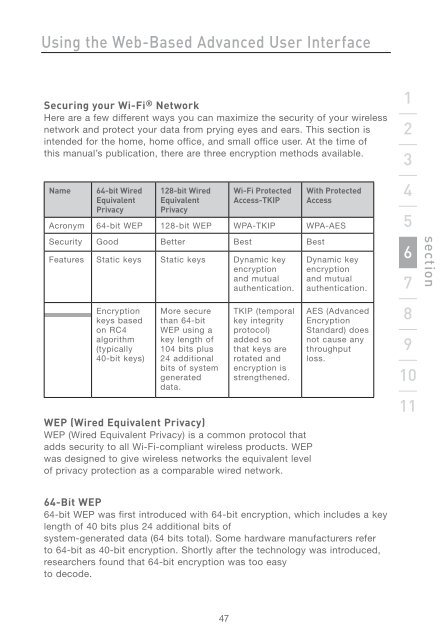Wireless G Router - Belkin
Wireless G Router - Belkin
Wireless G Router - Belkin
Create successful ePaper yourself
Turn your PDF publications into a flip-book with our unique Google optimized e-Paper software.
Using the Web-Based Advanced User Interface<br />
Securing your Wi-Fi ® Network<br />
Here are a few different ways you can maximize the security of your wireless<br />
network and protect your data from prying eyes and ears. This section is<br />
intended for the home, home office, and small office user. At the time of<br />
this manual’s publication, there are three encryption methods available.<br />
Name 64-bit Wired<br />
Equivalent<br />
Privacy<br />
128-bit Wired<br />
Equivalent<br />
Privacy<br />
47<br />
Wi-Fi Protected<br />
Access-TKIP<br />
With Protected<br />
Access<br />
Acronym 64-bit WEP 128-bit WEP WPA-TKIP WPA-AES<br />
Security Good Better Best Best<br />
Features Static keys Static keys Dynamic key<br />
encryption<br />
and mutual<br />
authentication.<br />
Encryption<br />
keys based<br />
on RC4<br />
algorithm<br />
(typically<br />
40-bit keys)<br />
More secure<br />
than 64-bit<br />
WEP using a<br />
key length of<br />
104 bits plus<br />
24 additional<br />
bits of system<br />
generated<br />
data.<br />
TKIP (temporal<br />
key integrity<br />
protocol)<br />
added so<br />
that keys are<br />
rotated and<br />
encryption is<br />
strengthened.<br />
WEP (Wired Equivalent Privacy)<br />
WEP (Wired Equivalent Privacy) is a common protocol that<br />
adds security to all Wi-Fi-compliant wireless products. WEP<br />
was designed to give wireless networks the equivalent level<br />
of privacy protection as a comparable wired network.<br />
Dynamic key<br />
encryption<br />
and mutual<br />
authentication.<br />
AES (Advanced<br />
Encryption<br />
Standard) does<br />
not cause any<br />
throughput<br />
loss.<br />
64-Bit WEP<br />
64-bit WEP was first introduced with 64-bit encryption, which includes a key<br />
length of 40 bits plus 24 additional bits of<br />
system-generated data (64 bits total). Some hardware manufacturers refer<br />
to 64-bit as 40-bit encryption. Shortly after the technology was introduced,<br />
researchers found that 64-bit encryption was too easy<br />
to decode.<br />
1<br />
2<br />
3<br />
4<br />
5<br />
6<br />
7<br />
8<br />
9<br />
10<br />
11<br />
section
















